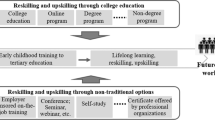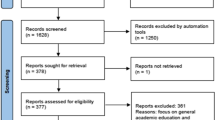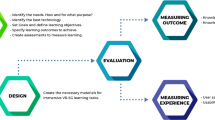Abstract
In order to remain competitive, engineers need to acquire competences necessary to attain the sustainability objectives that are emerging in the manufacturing industry. The training of current and future engineers needs to achieve two criteria: the learners need to be able to apply the learning into complex, life-like situations and the learning outcomes need to be achieved rapidly. Competence-based and technology-enhanced learning (TEL) in general and serious games and simulations in particular have recently attracted a great deal of attention as they have the potential to deliver on both accounts. Designing learning content for simulation style competence-based TEL environments places special demands on competence modelling. Competences are traditionally defined and modelled using internal-to-individual factors such as knowledge, skills and attitudes. However, designing simulation style competence-based TEL environments, such as serious games, cannot be based solely on these factors. In work situations competences are performed neither in solitude nor isolation. Contextual factors such as organization processes, laws and norms, the market and available technologies significantly influence competence performance. As the simulations in question need to be life-like constructions of work situations the role of contextual factors is heightened. In addition, the content area of sustainable manufacturing is novel, which adds to the challenge. The two main innovative contributions that are presented in this paper are: (1) an enhanced competence modelling methodology which aids in identifying and structuring relevant contextual factors that have an impact on the performance of the competences in question, and (2) the output of applying this methodology, i.e. a contextually enriched competence model in the field of sustainable manufacturing that can be used to facilitate the design of the TEL content for serious games and simulations. The work presented in the paper is a part of the European Seventh Framework Programme Integrated Project TARGET, the main aim of which is to develop a new genre of TEL environments that can be effectively used in engineering education to support future engineers’ rapid competence development in the field of sustainable manufacturing.
Similar content being viewed by others
References
Anderberg E., Norden B., Hansson B. (2009) Global learning for sustainable development in higher education: Recent trends and a critique. International Journal of Sustainability in Higher Education 10(4): 368–378
Andersen, B., Fradinho, M., Lefrere, P., Niitamo, V. (2009). The coming revolution in competence development: Using serious games to improve cross-cultural skills. Online Communities and Social Computing. doi:10.1007/978-3-642-02774-1_45 Key: citeulike:5866740.
ASCE. (2009). American Society of Civil Engineers. Code of ethics. Report. http://www.asce.org/uploadedFiles/Ethics_-_New/Code%20of%20Ethics%20October%202010.pdf. Accessed 15 Jan 2010.
Azapagic A., Perdan S., Shallcross D. (2005) How much do engineering students know about sustainable development? The findings of an international survey and possible implications for the engineering curriculum. European Journal of Engineering Education 30(1): 1–19
Biggs J. (1996) Enhancing teaching through constructive alignment. Higher Education 32(3): 347–364
Cerinsek G., Dolinsek S. (2009) Identifying employees’ innovation competency in organisations. International Journal of Innovation and Learning 6(2): 164–177
Cerinsek, G., Dolinsek, S., & Oliveira, M. (2007). Using critical incident technique with serious games as the next step in organizational competence development. Conference learning with games. Sophia Antipolis, France.
Cheetham G., Chivers G. (1999) Professional Competence: Harmonizing Reflective Practitioner and Competence-based Approaches. In: O’Reilly D., Cuningham L., Lester S. (eds) The capable practitioner: Professional capability through higher education. Kogan Page Limited, London, pp 215–226
De Eyto A., Mc Mahon M., Hadfield M., Hutchings M. (2008) Strategies for developing sustainable design practice for students and SME professionals. European Journal of Engineering Education 33(3): 331–342
De Graaff E., Kolmos A. (2003) Characteristics of problem-based learning. International Journal of Engineering Education 19(5): 657–662
de Haan G. (2010) The development of ESD-related competencies in supportive institutional frameworks. International Review of Education 56(2–3): 315–328
Desha C. J., Hargroves K., Smith M. H. (2009) Addressing the time lag dilemma in curriculum renewal towards engineering education for sustainable development. International Journal of Sustainability in Higher Education 10(2): 184–199
Digiesi, S, Mossa, G, Mummolo, G., Pilolli, R., & Ranieri, L. (2010). Learning sustainability through competitive game: Experiences from the vinyl chloride monomer (VCM) case study. In M. Taisch, J. Cassina, & R. Smeds (Eds.), 14th Workshop of the Special Interest Group (SIG) on experimental interactive learning in industrial management of the IFIP working group (pp. 62–70), Milano. http://sites.google.com/site/ifip57sigexilim/. Accessed 15 Jan 2011.
Dolinšek, S., Starcic, A., & Kopac, J. (2004). Education for manufacturing—From discipline to the competency based approach. In M. Taisch, E. Filos, P. Garello, K. Lewis, & M. Montorio, M. (Eds.), International IMS forum 2004, global challenges in manufacturing (pp. 1354–1362).
Duesterberg T. J., Preeg E. G. (2003) U.S. manufacturing: The engine for growth in a global economy. Greenwood Publishing Group, New York
Engeström Y. (1987) Learning by expanding: An activity-theoretical approach to developmental research. Orienta-Konsultit Oy, Helsinki
Fenner R. A., Ainger C. M., Cruickshank H. J., Guthrie P. M. (2005) Embedding sustainable development at Cambridge University Engineering Department. International Journal of Sustainability in Higher Education 6(3): 229–241
Flanagan J. C. (1954) The critical incident technique. Psychological Bulletin 51(4): 327–358
Fokkema J., Jansen L., Mulder K. (2005) Sustainability: Necessity for a prosperous society. International Journal of Sustainability in Higher Education 6(3): 219–228
Forum for the Future. (2004). Higher education partnership for sustainability. Learning and skills for sustainable development, report. http://www.forumforthefuture.org/files/learningandskills.pdf. Accessed 15 Sept 2010.
Glasersfeld E. V. (1995) A Constructivist Approach to Teaching. In: Steffe L. P., Gale J. (eds) Constructivism in education. Lawrence Erlbaum Associates, New Jersey, pp 3–16
Hague, J. B., Riedel, J., Fradinho, M., & Westra, W. (2010). Addressing research fragmentation in serious gaming for manufacturing. In M. Taisch, J. Cassina, & R. Smeds (Eds.), 14th Workshop of the Special Interest Group (SIG) on experimental interactive learning in industrial management of the IFIP working group (pp. 62–70), Milano. http://sites.google.com/site/ifip57sigexilim/. Accessed 15 Jan 2011.
Halevi, G., & Wang, K. (2007). Knowledge based manufacturing systems. Journal of Intelligent Manufacturing. doi:10.1007/s10845-007-0049-1.
Higher Education Academy. (2008). Education for sustainable development in engineering. Report of a Delphi consultation. Engineering Subject Centre of the University of Manchester, UK. http://www.engsc.ac.uk/downloads/scholarart/delphi-consultation.pdf. Accessed 5 Jan 2011.
Holmberg J., Svanstrom M., Peet D.-J., Mulder K., Ferrrer-Balas D., Segalas J. (2008) Embedding sustainability in higher education through interaction with lecturers: Case studies from three European technical universities. European Journal of Engineering Education 33(3): 271–282
Hulpus I., Fradinho M., Hayes C. (2010) On-the-fly adaptive planning for game-based learning. In: Bichindaritz I., Montani S. (eds) ICCBR 2010, LNAI 6176. Springer, Heidelberg, pp 375–389
Hunt, I., Brien, E., Tormey, D., Alexander, S., McQuade, E., & Hennessy, M. (2011). Educational programmes for future employability of graduates in SMEs. Journal of Intelligent Manufacturing. doi:10.1007/s10845-011-0519-3.
ICEE. (1977). Intergovernmental Conference on Environmental Education in Tbilisi. UNESCO report. http://unesdoc.unesco.org/images/0003/000327/032763eo.pdf. Accessed 5 Jan 2011.
IEA: (2007) Tracking industrial energy efficiency and CO2 emissions. OECD/IEA, Paris
IMS. (2007). Euro Swiss MTP workshop, Zurich. http://cordis.europa.eu/ims/past001_en.html. Accessed 15 Nov 2010.
Johnston P., Everard M., Santillo D., Robert K.H. (2007) Reclaiming the definition of sustainability. Environmental Science and Pollution Research International 14(1): 60–66
Kebritchi M., Hirumi A. (2008) Examining the pedagogical foundations of modern educational computer games. Computer Education 51(4): 1729–1743
Kirschner P., Van Vilsteren P. (1997) The design of a study environment for acquiring academic and professional competence. Studies in Higher Education 22(2): 151–175
Kolb D. A. (1984) Experiential learning. Prentice Hall, New Jersey
Kolmos A. (2006) Future engineering skills, knowledge, and identity. In: Christensen J., Henriksen A. L. B., Kolmos A. (eds) Engineering science, skills, and bildung. Aalborg University Press, Aalborg, pp 165–185
Kolmos A., de Graaff E. (2007) Process of changing to PBL. In: de Graaff E., Kolmos A. (eds) Management of change: Implementation of problem-based and project-based learning in engineering. SENSE Publisher, Rotterdam, pp 31–44
Laakso-Manninen R., Viitala R. (2007) Competence management and human resource development. A theorethical framework for understanding the practices of modern finnish organizations. Haaga-Helia, Helsinki
Lave J., Wenger E. (1991) Situated learning. Legitimate peripheral participation. University of Cambridge Press, Cambridge
Leahu-Aluas, S. (2010). Sustainable manufacturing—An overview for manufacturing engineers. Resource document. Sustainable manufacturing consulting. http://sustainablemanufacturing.biz/media/DIR_17101/9543103a2878dfb8ffff83b8ffffd524.pdf. Accessed 15 Sept 2010.
Lehmann M., Christensen P, Du X., Thrane M. (2008) Problem-oriented and project-based learning (POPBL) as an innovative learning strategy for sustainable development in engineering education. European Journal of Engineering Education 33(3): 283–295
Leontiev A. N. (1978) Activity, consciousness, and personality. Prentice-Hall, Englewood Cliffs
Leontiev A. N. (1981) Problems of the development of the mind. Progress, Moscow
Lewin K. (1943) Defining the “field at a given time”. Psychological Review 50(3): 292–310
Lucena J., Schneider J. (2008) Engineers, development, and engineering education: From national to sustainable community development. European Journal of Engineering Education 33(3): 247–257
Mansfield R. S. (1996) Building competence models: Approaches for HR professionals. Human Resource Management 35(1): 7–18
Maxwell D., Sheate W., van der Volst R. (2006) Functional and systems aspects of the sustainable product and service development approach for industry. Journal of Cleaner Production 14(17): 1466–1479
McClleland D.C. (1973) Testing for Competence rather than for “intelligence”. American Psychologist 28(1): 1–14
NAE: (2004) The engineer of 2020: Visions of engineering in the new century. The National Academies Press, Washington, DC
NCS. (2007). Standards for sustainability. Resource manual. National Centre for Sustainability at Swinburne University of Technology. https://www.skillsonline.net.au/clearhse/Preview.do?no=216&type=O. Accessed 15 Sept 2010.
O’Sullivan, D., Rolstadas, A., & Filos, E. (2009). Global education in manufacturing strategy. Journal of Intelligent Manufacturing. doi:10.1007/s10845-009-0326-2.
OECD. (2009). Sustainable manufacturing and eco-innovation. Synthesis report. http://www.oecd.org/dataoecd/15/58/43423689.pdf. Accessed 15 Sept 2010.
Pearn M., Kandola R. (1990) Job analysis, a practical guide for managers. Institute for Personnel Management, London
Petersen, S., & Heikura, T. (2010). Modelling project management and innovation competences for technology enhanced learning. EChallenges 2010, Warsaw, Poland.
Porritt, J. (2007). The critical role of educating future generations to tackle the key challenges in global sustainability. Keynote speech at the global sustainability forum: The future for engineering education. http://www3.imperial.ac.uk/globalsustainability. Accessed 15 Sept 2010.
PROLEARN. (2005). Network of excellence, IST 507310. http://www.prolearn-project.org. Accessed 15 Nov 2010.
PROLIX. (2010). Project website. http://www.prolixproject.org/. Accessed 15 Nov 2010.
Ribeiro, C., Jepp, P., & Pereira, J. (2010). Lessons learnt in building serious games and virtual worlds for competence development. In M. Taisch, J. Cassina, & R. Smeds (Eds.), 14th Workshop of the Special Interest Group (SIG) on experimental interactive learning in industrial management of the IFIP working group (pp. 52–61). Milano. http://sites.google.com/site/ifip57sigexilim. Accessed 15 Jan 2011.
Rolstadas A., Dolinsek S. (2006) Global education in manufacturing: Basic framework, industrial survey and possible implementation. Managing Global Transitions 4(3): 261–278
Royal Academy of Engineering. (2005). Engineering for sustainable development, Guiding principles. London UK: The Royal Academy of Engineering.
Sampson D. G., Fytros D. (2008) Competence models in technology-enhanced competence-based learning. In: Adelsberger H. H., Kinshuk J.M., Pawlowski S., Sampson D. (eds) International handbook on information technologies for education and training (2nd ed.). Springer, New York, pp 1–25
Scholz-Reiter, B., Gavirey, S., Echelmeyer, W., Hamann, T., & Doberenz, R. (2002). Developing a virtual tutorial system for online simulation games. In Proceedings of the 30th SEFI annual conference. Firenze, Italy.
Spencer L., Spencer S. (1993) Competence at work: Models for superior performance. Wiley, New York
Taisch, J., Cassina, R., & Smeds, R. (2010). Experimental learning on sustainable management, economics and industrial engineering. 14th Workshop of the Special Interest Group (SIG) on experimental interactive learning in industrial management of the IFIP working group. Milano, 2010. http://sites.google.com/site/ifip57sigexilim/. Accessed 15 Nov 2010.
TARGET. (2010). FP7 project, annex 1: Description of work.
TENCompetence. (2008). Project website. http://www.tencompetence.org/. Accessed 15 Nov 2010.
UN. (1992). United Nations agenda 21: Earth summit—The United Nations programme of action from Rio. http://www.un.org/esa/dsd/agenda21/res_agenda21_00.shtml. Accessed 15 Sept 2010.
UN. (2002). United Nations report of the world summit on sustainable development. http://www.un.org/jsummit/html/documents/documents.html. Accessed 15 Sept 2010.
UNESCO. (2004). United Nations decade of education for sustainable development: Draft international implementation scheme. Paris: United Nations Educational, Scientific and Cultural Organization
Urdan T. A., Weggen C. C. (2000) Corporate e-learning: Exploring a new frontier. WR Hambrecht, San Francisco
Vygotsky L.S. (1925) Consciousness as a problem in the psychology of behaviour. Soviet Psychology 17(4): 3–35
Vygotsky L. S. (1978) Mind in society: The development of higher mental processes. Harvard University Press, Cambridge, MA
WECD: (1987) World commission on environment and development, our common future. Oxford University Press, New York
WCSD. (2010). World Centre for Sustainable Development. E-brochure. http://www.pagegangster.com/p/MwNhJ/. Accessed 15 Sept 2010.
Wert, T. J. (2004). ICT-rich and competency based learning in higher education. In: A. J. Kallenberg, & van de M. J. J. M. Ven, Proceedings of the new educational benefits of ICT in higher education. Rotterdam: Erasmus Plus BV, OECR.
Westera W. (2001) Competences in education: A confusion of tongues. Journal of curriculum studies 33(1): 75–88
Wong, W. L., Shen, C., Nocera, L., Carriazo, E., Tang, F., Bugga, S., et al. (2007). Serious video game effectiveness. In Proceedings of the international conference on advances in computer entertainment technology (Salzburg, Austria, June 13-15, 2007). ACE ’07 (Vol. 203, pp. 49–55). New York, NY:ACM. http://doi.acm.org/10.1145/1255047.1255057. Accessed 15 Jan 2011.
Wulf W.A., Fischer G. (2002) A makeover for engineering education. The National Academic Press, Washington, DC
Author information
Authors and Affiliations
Corresponding author
Rights and permissions
About this article
Cite this article
Cerinšek, G., Petersen, S.A. & Heikura, T. Contextually enriched competence model in the field of sustainable manufacturing for simulation style technology enhanced learning environments. J Intell Manuf 24, 441–455 (2013). https://doi.org/10.1007/s10845-011-0554-0
Received:
Accepted:
Published:
Issue Date:
DOI: https://doi.org/10.1007/s10845-011-0554-0




